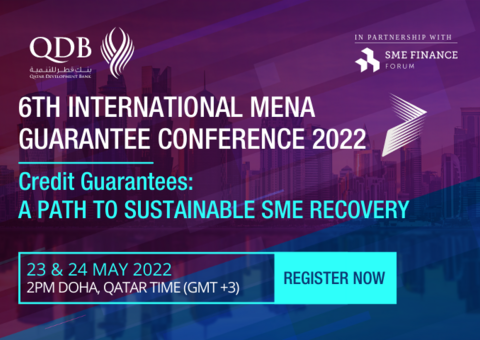Blog
What comes next in the MENA region? SME Recovery and the Role of Credit Guarantees

If the unofficial theme of last year’s MENA Credit Guarantee Conference was how to move past the Covid emergency, this year it was about preparing for what comes next. Adulrahman Hesham al-Suwaidi, CEO of Qatar Development Bank (this year’s co-host) set the tone in his opening remarks, encouraging speakers to look ahead at how guarantee institutions will handle their greatly expanded post-Covid mandate.
Keynote speakers, including Nagla Bahr (Managing Director of CGCE), and Khawaja Aftab Ahmed (Regional Director of IFC in the Middle East) explored how this expanded mandate has come about, pointing to the importance of risk mitigation during a period of successive macroeconomic shocks. They also highlighted the immense size of the SME finance gap in the region, with SMEs making up 70% of the region’s employment and yet receiving just 8% of lending. On a more positive note, they also highlighted the huge response to Covid in the form of finance for SMEs from guarantees and the push for digitalization that is changing the role model both for financiers and SMEs themselves.
The panel sessions dug deeper into these themes. On the first day, panelists discussed the growing importance of green finance in SME lending, noting that green finance is not only a way for guarantee institutions to contribute to a better future, but a means to reduce risk, noting the correlation between higher ESG scores and lower credit risk profiles. In practice, Min Ki Jeon of KODIT described how green priorities were now being built into qualitative credit evaluations, enhancing the traditional quantitative model. The day’s final panel took a broader look at innovative models in guarantees, with panelists – and audience members – emphasizing the possibilities of portfolio guarantee models, especially in high-risk environments including Yemen and Gaza. Speakers in this panel highlighted that they also implemented digital process to speed both assessment and disbursement. FMO concluded saying that overall, guarantee funds need to strengthen their data acquisition and analytics capabilities.
On the second day, panelists dug into the subjects of digitization, supply chain finance, and credit risk management. Here, speakers began to unpack some of the challenges inherent in the post-covid paradigm. Lack of awareness emerged as a key obstacle. Jumsheed Hussain of QDB described how his colleagues now go all the way to the factory floor of their SME clients to raise digital awareness and push digitization (literally) from the ground up. Neha Tyagi of C2FO described how the very categorization of these businesses as “MSMEs” can be an alien concept to informal micro businesses. An array of further challenges emerged from the risk management panel, with panelists highlighting the delicate process of tapering off Covid-era stimulus and need to obtain reliable digital data.
The conference closed with remarks from Tahar Ben Hatira, Director General of Tunisia’s SOTUGAR, who will be hosting next year’s conference. He stressed the significance of the conference, noting that it provides unique opportunities for credit guarantee institutions and financial institutions from around the globe to share knowledge and learn from each other’s experiences - which will result in more productive collaboration and more impactful innovations for the development and growth of SMEs.
MORE ON THE the 6th International MENA Guarantee Conference 2022



